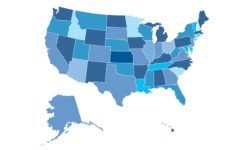Proposed Colo. Bills Could Create Troubling Precedent
Retroactive school violence legislation that is currently being considered by the Colorado legislature could threaten risk management programs and put significant financial strain on districts and other public institutions.

The bills currently being considered would change the law retroactively to Jan. 1, 2013, allowing plaintiffs to sue public schools for damages up to $900,000 per incident and $350,000 per person.
Let’s say you are playing a game of cards. You know the rules in advance and you develop your strategy based on those rules. As the game progresses, you’re holding your own. You win some hands and your opponents win some.
Now, imagine you are half-way through the game, and the rules are changed retroactively in the other players’ favor. That wouldn’t be fair, would it? Well, that appears to be what Colorado politicians are attempting. However, their attempts apply to school security, not to a meaningless card game.
In March, the Colorado legislature introduced bills backed by the parents of Claire Davis, who was killed in the 2013 shooting at Arapahoe High School. The bills currently being considered would change the law to retroactively apply to incidents occurring on or after Jan. 1, 2013, allowing her family to sue for damages up to $900,000 per incident and $350,000 per person.
As a general rule, I’m not opposed to damages being awarded. In fact, the potential for financial penalties is often one of the best motivations for campuses to make safety and security improvements. However, I’m deeply concerned with the prospect of Colorado changing the rules of the game after the fact. If these bills pass, they could set a bad precedent that other states could soon follow and throw K-12 districts’ risk management programs throughout the nation into chaos.
We don’t change the laws retroactively in criminal cases because doing so would be unfair to the defendants. It’s also unconstitutional. The same reasoning should apply to civil cases against public K-12 school districts.
Another issue I see with Colorado’s proposed legislation is that it would allow plaintiffs to depose school officials before filing a lawsuit, enabling their attorneys to go on a legal fishing expedition. Although the Davis case may be very compelling and the family’s concerns legitimate, this provision of the proposed legislation would open the door to a tidal wave of actions by others with much less meritorious claims. I suspect the legal and insurance costs for K-12 school districts would sky rocket.
The bills being considered by the Colorado legislature appear to have a lot of support on both sides of the aisle. These legislators, however, would be wise to consider the long-term legal and financial ramifications not only for their state, but the nation as a whole.
As far as the Davis’ claims are concerned, the Littleton School Board approved an agreement on Thursday that it made with her family, reports Fox 31. The family has agreed not to sue the school district if it releases the information it has about the 2013 shooting.
Considering Claire Davis’ family’s claims are resolved, wouldn’t it be better for Colorado’s politicians to make changes to the laws before another incident occurs rather than after? Also, regarding the deposition provision, now that the Davis matter is settled, does the state of Colorado really want to expose its public schools to fishing expeditions by plaintiff attorneys? I think not.
Photo Granicus
If you appreciated this article and want to receive more valuable industry content like this, click here to sign up for our FREE digital newsletters!
 Leading in Turbulent Times: Effective Campus Public Safety Leadership for the 21st Century
Leading in Turbulent Times: Effective Campus Public Safety Leadership for the 21st Century
This new webcast will discuss how campus public safety leaders can effectively incorporate Clery Act, Title IX, customer service, “helicopter” parents, emergency notification, town-gown relationships, brand management, Greek Life, student recruitment, faculty, and more into their roles and develop the necessary skills to successfully lead their departments. Register today to attend this free webcast!








